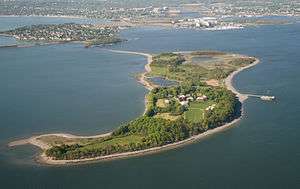David Thompson (New Hampshire settler)
David Thompson (1593–1628) was the first non-native settler of New Hampshire and the namesake of Thompson Island in Boston Harbor. He may have been a descendant of Sir Thomas Stewart, Master of Mar.[1]

Early life and ancestry
David Thompson was born in Corstorphine, a village in the Kingdom of Scotland. His father was the Reverend Richard Thomson (c. 1564-1606), who had received an ecclesiastical appointment from James VI of Scotland (reigned 1567–1625).[1] The identity of David's mother is unknown. His stepmother (Richard Thomson's second wife) was Agnes Foulis.[1]
Richard Thomson was a son of Bernard Thomson and Agnes Balzert. His paternal grandparents were Alexander Thomson (d. 1587) and Janet Gourlay. His great-grandparents were Alexander Thomson (c. 1460-1513) and Margaret Forrester. This Alexander died in combat during the Battle of Flodden (1513). Margaret was reportedly a great-granddaughter of John Forrester of Corstorphine, who had served as Lord High Chamberlain of Scotland.[1]
Alexander Thomson (c. 1460-1513) was thought to be a son or grandson of Thomas Stewart, Master of Mar. The name Thomson is a Scottish patronymic surname, and literally means "son of Thomas".[1] Thomas Stewart was a son of Alexander Stewart, Earl of Mar (d. 1435), grandson to Alexander Stewart, Earl of Buchan, and great-grandson of Robert II of Scotland and Elizabeth Mure.[1]
David Thompson is first mentioned in 1602, when he received a bursary to attend the University of Edinburgh and study philosophy.[1] As a teenager David Thompson traveled to the New England Colonies, as part of the Popham Colony (in Maine) in 1607. He returned to England and married Amias Cole, the daughter of a shipyard owner, and they had three children, Ann, Priscilla, and John, before Thompson returned to New England. In England, Thompson came to know Squanto before his return to Plymouth, Massachusetts, and Thompson sailed with Squanto to New England in 1619.[2] Thompson helped rescue a stranded Native American boy on the Isle of Shoals during his 1619 trip, and the boy was given to Thompson as a servant by the local sachem.[2]
Background of founding the New Hampshire colony
The colony that became the state of New Hampshire was founded on the division in 1629 of a land grant given in 1622 by the Council for New England to Captain John Mason (former governor of Newfoundland) and Sir Ferdinando Gorges (who founded Maine). The colony was named "New Hampshire" by Mason after the English county of Hampshire, one of the first Saxon shires. John Mason sent David Thompson to set up the first settlement.
David Thompson first settled at Odiorne's Point in Rye (near Portsmouth) with a group of fishermen from England[3] in 1623, just three years after the Pilgrims landed at Plymouth. The settlers built a fort, manor house and other buildings, some for fish processing, on Flake Hill at the mouth of the Piscataqua River, naming the settlement "Pannaway Plantation". In 1623 the English explorer Christopher Levett, an associate of Gorges and a member of the Council for New England, wrote of visiting Thompson at his Pannaway Plantation.[4][5][6] Early historians believed the first native-born New Hampshirite, John Thompson, was born there; later he was found to have been baptized at St. Andrew's Parish in Plymouth, England, in 1619.[7]
Disappearance after moving to Boston
David Thompson had been sent by Mason, to be followed a few years later by Edward and William Hilton. Thompson moved his family to an island in Boston Harbor (today called Thompson Island in his honor) in 1626, and he may have had a fur trading post on the island prior to moving there. The Thompsons became some of the first European settlers of Boston, Massachusetts. David Thompson disappeared in 1628 and was never heard from again. Some historians theorize he was the victim of foul play. Others suggest that he accidentally drowned in Boston Harbor. Thompson's widow, Amias (1596–1672), remarried to Samuel Maverick of Noddle's Island. Thompson's son later successfully recovered ownership of the island from the town of Dorchester, before another party acquired it.[8]
See also
References
- "Ancestry of David THOMPSON/THOMSON". www.wellswooster.com. Retrieved 2017-01-10.
- Riley, Nancy (4 September 2016). "My New England Ancestors: David Thomson the Founding Father of New Hampshire".
- Robinson, J. Dennis. "David Thomson vs. the Pilgrims". www.seacoastnh.com. Retrieved 2017-01-10.
- Smith, Helen Ainslie (1901-01-01). The Thirteen Colonies: Virginia, Massachusetts, New Hampshire, New York. G.P. Putnam's Sons. p. 175.
- Lyford, James Otis (1896-01-01). History of Concord, New Hampshire: From the Original Grant in Seventeen Hundred and Twenty-five to the Opening of the Twentieth Century. Rumford Press. p. 67.
- Jenness, John Sribner (1873-01-01). The Isles of Shoals: An Historical Sketch. p. 49.
- Anderson, Robert Charles (1995). The Great Migration Begins: Immigrants to New England, 1620-1633. 3. Boston, MA: New England Historic Genealogical Society.
- Ralph E. Thompson and Matthew R. Thompson. First Yankee: David Thomson, 1592-1628—The Story of New Hampshire's First Settler